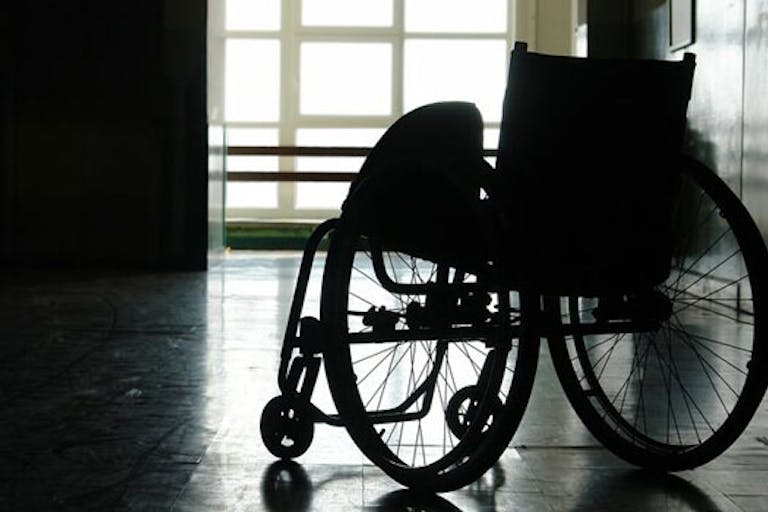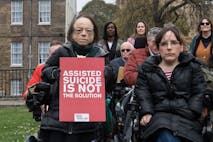
Christian college allows pro-life club after resolving 'misunderstanding'
Bridget Sielicki
·
United Nations disability advocate ‘extremely concerned’ about rights in Canada
Last year, Roger Foley made international headlines when he went public with his story. The Canadian man claimed that the state health care system refused to provide him the care he needs, and instead, was pressuring him to choose euthanasia. Foley, along with several others, filed an official complaint with the United Nations, who sent a disabilities advocate to investigate. And after touring the country, she has declared that systemic change is needed in how Canada treats people with disabilities.
Catalina Devandas Aguilar is a lawyer from Costa Rica, and the United Nation’s first Rapporteur on the Rights of Persons with Disabilities. Devandas Aguilar spent a week in Canada, touring the country and reviewing cases of people with disabilities, to see if they are receiving the care they need. Foley’s case was one of the many that she reviewed.
“I am a patient barely who is barely hanging on to life and suffering enough with my disabilities,” Foley told CTV. He has complained of being given the wrong medications, being served food that gives him food poisoning, being injured during exercises and transfers, and numerous other issues. He requested to choose his own home health care team, but the government refused, leaving him stranded in the hospital to receive care. They then gave him an ultimatum: pay $1,800 a day for hospital care, be forcibly discharged, or undergo euthanasia. “I have not received the care that I need to relieve my suffering and have only been offered assisted dying,” Foley said in a previous interview with CTV. “I have many severe disabilities and I am fully dependent. With the remaining time I have left, I want to live with dignity and live as independently as possible.”
Devandas Aguilar’s investigation found that Foley’s case is not an anomaly. She found numerous cases of people with disabilities pressured into assisted suicide, patients with disabilities forced into nursing homes, and a court system that does not reinforce their rights. “Persons with disabilities have to initiate very lengthy and onerous legal procedures to get their rights recognized,” she said to CTV. And in her statement, she explained that there are many issues in Canada that people with disabilities face.
“[D]uring my visit I have noticed that discussions about the rights of persons with disabilities are still framed in terms of social assistance, rather than from a human rights-based approach,” she wrote, adding, “I have also noted significant disparities in the areas of accessibility and access to education, health, administration of justice, and social protection depending on where a person with disabilities lives in Canada.”
READ: People with disabilities and terminal illnesses speak out against assisted suicide
When it comes to assisted suicide, Devandas Aguilar wrote an extremely strongly-worded condemnation, and their right to life. She said in her statement:
Article continues below
Dear Reader,
Have you ever wanted to share the miracle of human development with little ones? Live Action is proud to present the "Baby Olivia" board book, which presents the content of Live Action's "Baby Olivia" fetal development video in a fun, new format. It's perfect for helping little minds understand the complex and beautiful process of human development in the womb.
Receive our brand new Baby Olivia board book when you give a one-time gift of $30 or more (or begin a new monthly gift of $15 or more).
I am extremely concerned about the implementation of the legislation on medical assistance in dying from a disability perspective. I have been informed that there is no protocol in place to demonstrate that persons with disabilities have been provided with viable alternatives when eligible for assistive dying. I have further received worrisome claims about persons with disabilities in institutions being pressured to seek medical assistance in dying, and practitioners not formally reporting cases involving persons with disabilities.
I urge the federal government to investigate these complaints and put into place adequate safeguards to ensure that persons with disabilities do not request assistive dying simply because of the absence of community-based alternatives and palliative care.
Foley is far from alone; CTV, for example, told the story of Sean Tagert, who has ALS, and lives with his mother and his 11-year-old son. As his disease progresses, Tagert needs round-the-clock care, but the government would only provide it in an institution four hours away from his family, where he would be forced to live, alone. Instead, Tagert said he will choose assisted suicide. “This is about ripping him from his home and family and community and sticking him far away in a place where he will die alone,” Rhonda Wiebe, co-chair of the Council of Canadians with Disabilities Ending of Life Ethics Committee, said to CTV.
Another woman, Sheila Elson, has a 25-year-old daughter, Candice Lewis, with disabilities. When she brought Lewis to the hospital for care after she became sick, a doctor took Elson outside and pressured her to euthanize her daughter, within earshot of Lewis, who understood what the doctor was saying and is capable of communicating. When Elson refused, the doctor called her selfish.
People with disabilities are as deserving of human rights as able-bodied people. Yet in places where assisted suicide is legal, it is increasingly common for people with disabilities to be deprived of their rights and pushed towards death. Devandas Aguilar’s report is sorely needed, but the question is… will it make any difference?
“Like” Live Action News on Facebook for more pro-life news and commentary!
Live Action News is pro-life news and commentary from a pro-life perspective.
Contact editor@liveaction.org for questions, corrections, or if you are seeking permission to reprint any Live Action News content.
Guest Articles: To submit a guest article to Live Action News, email editor@liveaction.org with an attached Word document of 800-1000 words. Please also attach any photos relevant to your submission if applicable. If your submission is accepted for publication, you will be notified within three weeks. Guest articles are not compensated (see our Open License Agreement). Thank you for your interest in Live Action News!

Bridget Sielicki
·
Analysis
Angeline Tan
·
Analysis
Cassy Cooke
·
Politics
Madison Evans
·
Opinion
Nancy Flanders
·
Investigative
Carole Novielli
·
Analysis
Cassy Cooke
·
International
Cassy Cooke
·
International
Cassy Cooke
·
Politics
Cassy Cooke
·
Pop Culture
Cassy Cooke
·